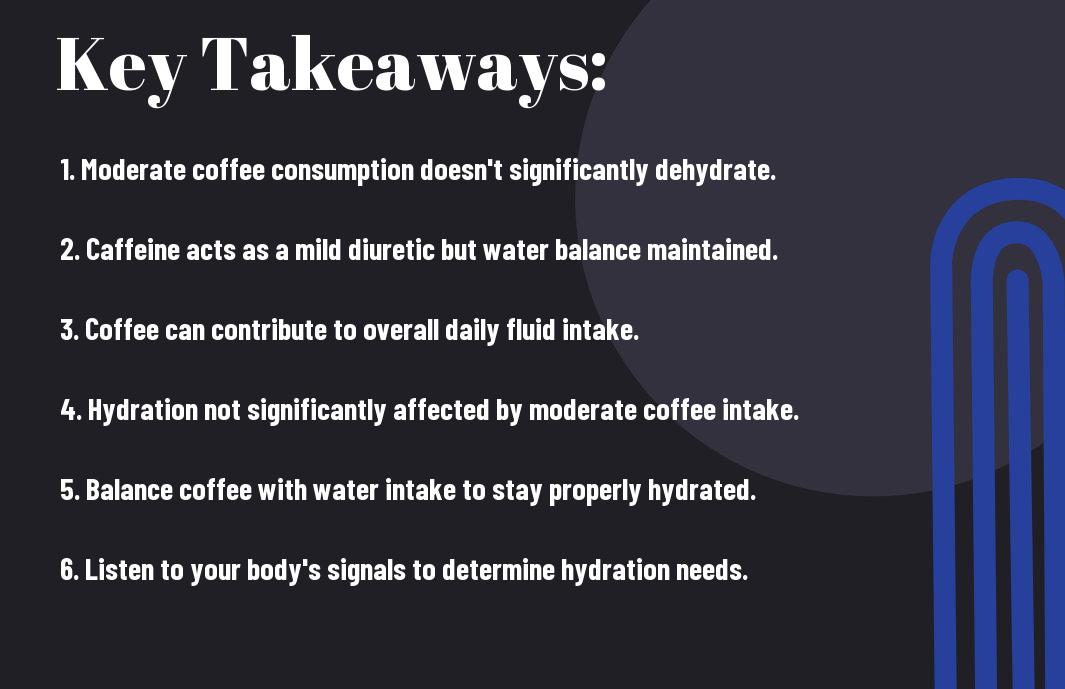It’s a common morning ritual for many, but have you ever considered how your daily coffee affects your hydration levels? In this informative post, we’ll investigate into the relationship between coffee consumption and hydration. Are you really getting dehydrated from that cup of joe, or is it just a myth? Let’s uncover the truth behind how your favorite caffeine fix impacts your body’s hydration status.
Key Takeaways:
- Caffeine is a Mild Diuretic: Despite common belief, moderate coffee consumption does not necessarily lead to dehydration. While caffeine is a diuretic, the effect is mild and does not cause significant fluid loss.
- Water Replacement: It is recommended to replace the lost fluids from coffee consumption by drinking water throughout the day. This helps maintain proper hydration levels and counteracts any potential mild diuretic effects of caffeine.
- Individual Tolerance Varies: The impact of coffee on hydration can vary among individuals based on their overall health, level of physical activity, and tolerance to caffeine. Monitoring your own body’s response is key.
- Hydration is Multifaceted: Hydration is not solely determined by coffee consumption. Factors such as diet, climate, and exercise also play significant roles in overall hydration levels. It’s important to consider the broader context.
- Enjoy in Moderation: Generally, moderate coffee consumption can be part of a well-balanced diet and hydration plan. Being mindful of your caffeine intake and balancing it with sufficient water intake is key to maintaining proper hydration levels.

The Basics of Hydration
What is hydration?
To understand hydration, it is imperative to grasp that it refers to the body’s ability to manage water. An adequate intake of fluids is crucial for overall health. When we consume water or other beverages, the body absorbs and uses this liquid to maintain imperative functions such as regulating body temperature, aiding digestion, and transporting nutrients.
Importance of hydration for the human body
Hydration plays a vital role in keeping the body functioning optimally. Water is involved in nearly every bodily process, including maintaining the balance of bodily fluids, supporting cell function, and aiding in the transportation of nutrients. Dehydration can lead to various health issues, ranging from mild symptoms like fatigue and headaches to more severe conditions such as kidney stones or urinary tract infections.
The human body is made up of about 60% water, which underscores its importance in our daily functioning. Staying hydrated is crucial for maintaining energy levels, focus, and overall well-being. It is recommended to consume an adequate amount of fluids daily to support the body’s various functions and promote good health.

Caffeine and Its Effects
What is caffeine?
You may start your day with a cup of coffee, a can of soda, or a dose of chocolate – all of which contain caffeine. Caffeine is a natural stimulant found in various plants like coffee beans, tea leaves, and cacao pods. It is the most commonly consumed psychoactive substance in the world, known for its ability to boost alertness and reduce fatigue.
How does caffeine work in the body?
An imperative aspect of caffeine’s effect is its ability to block adenosine, a neurotransmitter that promotes relaxation and sleepiness. By inhibiting adenosine, caffeine increases the firing of neurons and the release of other neurotransmitters such as dopamine and norepinephrine, leading to heightened brain activity and enhanced focus.
Does caffeine affect everyone the same way? Not necessarily. Individuals can have different sensitivities to caffeine, impacting how they respond to its stimulant effects. Factors such as genetics, tolerance levels, and overall health can influence how caffeine interacts with one’s body.
Diuretic effects of caffeine
An intriguing aspect of caffeine is its diuretic properties. Many people believe that caffeinated beverages like coffee and tea can lead to dehydration due to their diuretic effects. However, while caffeine does have mild diuretic properties, research suggests that the amount of liquid consumed in caffeinated beverages can offset the fluid loss caused by increased urination.
Caffeine’s diuretic effects vary depending on the individual’s caffeine habit, hydration status, and the amount of caffeine ingested. In moderation, caffeine consumption may not significantly impact hydration levels, especially when consumed as part of a well-balanced diet and lifestyle.

Coffee Consumption and Hydration
Your daily cup of coffee is a staple for many people, but have you ever wondered how it impacts your hydration levels? Let’s investigate the relationship between coffee consumption and hydration to better understand how your body is affected.
Does coffee dehydrate the body?
There is a common misconception that coffee is dehydrating due to its diuretic effect. While coffee may have a mild diuretic effect, studies show that moderate consumption does not significantly dehydrate the body. In fact, the water content in coffee can contribute to your daily fluid intake, helping you stay hydrated.
How much coffee is too much for hydration?
To maintain hydration, it’s crucial to be mindful of how much coffee you consume. While moderate coffee consumption is unlikely to cause dehydration, excessive intake can have diuretic effects that may offset the hydration provided by other beverages. Plus, excessive caffeine intake can lead to side effects like jitteriness and insomnia.
It’s recommended to limit coffee intake to around 400 milligrams of caffeine per day, which is roughly equivalent to 4 cups of coffee. Be sure to listen to your body’s signals and adjust your coffee consumption to ensure you stay adequately hydrated throughout the day.
Individual tolerance to caffeine and hydration
Just like with any stimulant, individual tolerance to caffeine can vary. Some people may be more sensitive to caffeine and experience dehydration effects even with moderate consumption, while others may tolerate higher amounts without issue. It’s crucial to pay attention to how your body responds to coffee and adjust your intake accordingly to maintain optimal hydration levels.
Factors such as age, weight, overall health, and caffeine sensitivity can all play a role in how coffee affects your hydration levels. If you find that coffee tends to dehydrate you, consider cutting back on your intake or opting for decaffeinated options to support better hydration.
Factors Influencing Hydration
Many factors can influence hydration levels in the body, including climate, physical activity, and diet. Understanding how these factors affect hydration is crucial for maintaining optimal fluid balance.
Climate and Humidity
An individual’s hydration needs can vary depending on the climate and humidity levels in their environment. In hot and humid conditions, the body may lose more fluids through sweat, increasing the risk of dehydration. It is imperative to drink plenty of fluids and electrolytes to replenish what is lost through perspiration.
- Hot and humid climates increase sweat production
- Increased sweat leads to higher fluid loss
- Drinking water and electrolyte-rich beverages is crucial in these conditions
Though, in cold and dry climates, the body may not feel as thirsty, but it is still important to stay hydrated to support overall well-being.
Physical Activity and Exercise
For those who engage in regular physical activity and exercise, maintaining proper hydration is vital for performance and recovery. Sweating during workouts can lead to significant fluid loss, impacting the body’s ability to function optimally.
Physical exertion increases the body’s need for fluids to prevent dehydration and maintain electrolyte balance. It is recommended to drink water before, during, and after exercise to support hydration levels and aid in muscle recovery.
Diet and Nutrition
Climate can also play a role in hydration levels, as certain foods like fruits and vegetables have high water content and can contribute to overall hydration. A balanced diet rich in hydrating foods can support hydration levels alongside fluid intake.
The body can also obtain water from foods like soups, smoothies, and juicy fruits, providing an additional source of hydration throughout the day. Maintaining a well-rounded diet is key to supporting overall hydration and health.
The Role of Water in Coffee
Water content in coffee
All coffee begins with water. The composition of this popular beverage is largely dependent on the quality and quantity of water used during the brewing process. The water content in coffee plays a significant role in determining its flavor, aroma, and strength.
How brewing methods affect water content
Coffee brewing methods have a direct impact on the water content in the final cup. Factors such as brewing time, temperature, and pressure can influence how much water is extracted from the coffee grounds. Different brewing methods, such as espresso versus drip coffee, result in varying water contents and, consequently, diverse flavor profiles.
Plus, the grind size of the coffee beans also affects water extraction. Finely-ground beans have a larger surface area and allow for more thorough water penetration, leading to a stronger brew. Conversely, coarsely-ground beans may result in a milder flavor because the water interacts with less surface area of the bean.
Can coffee contribute to daily water intake?
One common misconception is that coffee dehydrates the body due to its caffeine content. However, moderate coffee consumption can contribute to daily water intake. While caffeine is a diuretic that may increase urine production, the water in coffee still counts towards your overall fluid intake for the day.
Coffee lovers can rest assured that their favorite beverage can be part of their daily hydration routine. The key is to balance coffee consumption with plain water intake to stay adequately hydrated throughout the day.

Debunking Myths
The myth of coffee as a diuretic
Not all may know that the belief that coffee is a diuretic might not be as true as commonly thought. While it is true that caffeine has mild diuretic effects, studies have shown that regular coffee consumption doesn’t dehydrate the body as much as previously believed.
Caffeine and athletic performance
With regards to caffeine and athletic performance, there are conflicting views on its impact. Some studies suggest that caffeine can improve endurance and performance, while others indicate that the effects may vary depending on the individual’s tolerance to caffeine. It’s vital to consider the dosage and timing of caffeine consumption in relation to physical activity.
Performance in sports can be influenced by various factors, including caffeine intake. Athletes often use caffeine as an ergogenic aid to enhance endurance and focus during training or competitions. The stimulant properties of caffeine can help improve performance and delay fatigue, making it a popular choice among many athletes.
Coffee and hydration in special populations
Myths surrounding the effects of coffee on hydration in special populations, such as pregnant women or the elderly, can often lead to misconceptions. While moderation is key, studies have shown that moderate coffee consumption may not have significant adverse effects on hydration levels in these special populations.
This debunking of the belief that coffee is always a diuretic sheds light on the potential benefits of moderate coffee consumption, even for individuals who may require extra attention to hydration levels. By understanding the nuances of caffeine’s effects on the body, we can make informed choices about our coffee consumption habits.
To wrap up
With this in mind, it is important to be mindful of the impact that coffee consumption can have on hydration levels. While coffee can contribute to daily fluid intake, its diuretic properties mean that it may not be as effective at hydrating the body compared to water. It is important to maintain a balance and consider other hydrating options throughout the day to ensure optimal hydration levels.
FAQ
Q: Does coffee consumption cause dehydration?
A: Contrary to popular belief, moderate coffee consumption does not cause dehydration. While coffee is a diuretic, meaning it increases urine production, studies have shown that the amount of fluid retained from coffee offsets the diuretic effect, making it a net hydrator.
Q: How much coffee is considered moderate consumption?
A: Moderate coffee consumption is generally defined as 3-5 cups per day, with each cup containing about 8 ounces of coffee. Consuming within this range is unlikely to have significant dehydrating effects.
Q: Are there any factors that can influence the impact of coffee on hydration?
A: Yes, several factors can influence how coffee affects hydration. These include individual tolerance to caffeine, overall fluid intake, and the timing of coffee consumption. It’s important to listen to your body and adjust your coffee consumption based on how it makes you feel.
What are the origins of coffee









